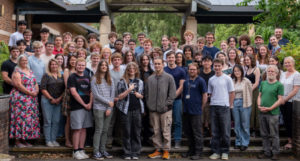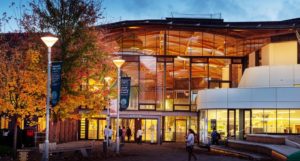Stark social mobility challenges in the South West leading to poorer children lagging behind in school, experts warn

The model can support pupils to develop mathematical connections
Stark social mobility challenges in the South West mean poorer children in the region are more likely to lag behind in school compared to their peers elsewhere in England, experts have warned.
Just 37 per cent of poorer children reached expected standards in reading, writing and maths at the end of primary school last year – the worst results in the country.
The work was carried out as part of the University of Exeter’s South West Social Mobility Commission, set up to transform educational and employment opportunities for young people in the peninsula.
The Commission is a response to poor levels of social mobility in the South West identified by University of Exeter experts. Its annual report for 2023 shows the situation is largely unchanged since the publication of an in-depth report last year, with several stark challenges remaining:
- At the end of primary school, fewer children from disadvantaged backgrounds in the South West reached expected standards in reading, writing and maths than in any other region in 2021/22 – just 37 per cent, compared with 43 per cent across England and 53 per cent in London, the best-performing regionInGCSE English and maths attainment, the South West is in line with the England average for all pupils (69 per cent) but below average for disadvantaged pupils (45 per cent compared with 49 per cent)
- In terms of advanced (Level 3) qualifications, including A-levels, the South West performed close to the England average for all pupils but significantly worse for disadvantaged pupils in 2020/21. Attainment was particularly poor in Torridge, where only 41 per cent of all students and 17 per cent of disadvantaged students achieved a Level 3 qualification – compared with 60 per cent of all students and 42 per cent of disadvantaged students across England
- The South West continues to have the fewest young people from any background going on to Level 4 or above education or training (which includes higher education and higher-level apprenticeships). Progression rates in the South West are 60 per cent for all young people and 50 per cent for those from disadvantaged backgrounds, compared with 77 per cent and 76 per cent respectively in London
- The South West peninsula continues to have high levels of overall employment but more unskilled workers than other parts of the country. For example, 44 per cent of individuals aged 25 to 34 in Bridgwater and West Somerset and 42 per cent in North Cornwall were in unskilled employment in 2021, compared with 28 per cent nationally
The Commission is being supported by a coalition of funders that includes Cornwall Council, Devon County Council, Somerset Council, the University of Exeter, the Great South West partnership and the Cobalt Trust.
Commissioners are passionate and dedicated civic leaders who are giving their time voluntarily to advocate for the region. They are:
- Sir Michael Barber – Chair of the Commission
- Professor Lisa Roberts, Vice Chancellor of the University of Exeter
- Kate Kennally, Chief Executive of Cornwall Council
- Paul von der Heyde, Chair of Somerset Integrated Care Board
- Lisa Mannall, Chief Executive of Cornwall Education Learning Trust and former South West Regional Schools Commissioner
- Sean Mackney, Principal and CEO of Petroc College
- Brendan Staniforth, Strategy Delivery Director at Devonport Royal Dockyard (Babcock International)
- Paul Crawford, Chief Executive of LiveWest
- Karl Tucker, Chair of Yeo Valley Ltd, Chair of Heart of the South West LEP and Chair of Great South West
- Tony Rowe, Chair and Chief Executive of Exeter Rugby Club
- Alice Thomson, Associate Editor, columnist and interviewer at The Times
- Andrew Moreman, Chief Executive of Young Devon
Commissioners will act as an advocate for the peninsula both nationally and regionally with the aim of highlighting the region’s social mobility challenges, embedding a social mobility perspective into organisational decision-making and holding civic leaders to account.
Commissioners will work with regional and local civic leaders to ensure a focus on social mobility underpins all forms of organisational decision-making. They will establish a strategy for addressing some of the region’s stubborn challenges.
The Commission will work with local and regional partners to develop and deliver programmes and best practice guidance to address the barriers faced by children, families and young people in the region.
Professor Elliot Major, one of the authors of the report, said: “Gains made over the past decade or so by disadvantaged children in other parts of the country haven’t been as pronounced in the South West. And while overall educational results in the region fall in line with other parts of the country, these results mask the very poor results being achieved by children from poorer backgrounds.
“The rurality and remoteness of many places can make the provision of education and other public services difficult. Teacher recruitment and retention is a problem for isolated schools, as is low churn. The consequences are a lower proportion of good and outstanding schools compared with other regions, and particularly so in deprived areas. Meanwhile, many young people across the region travel hours each day to access further education and drop-out rates are high. Accessing apprenticeships and work can also be challenging.”
Sir Michael Barber said: “The Commission brings together outstanding leaders from business, education, the voluntary sector and local government. It is ambitious for change. It has set out to combine the efforts of everyone across the region to enhance social mobility, increase opportunity and make the South West not only a wonderful place to visit but a wonderful place to live, work and bring up a family. A place of prospects, progress and prosperity for all.
“In the past, many times across the UK, we’ve seen insufficient collaboration across sectors to enable solutions to be found for the kind of deep-seated social problems we face in the South West. Our Commission will ensure that this time the necessary collaboration is strong, focused and sustained.”



